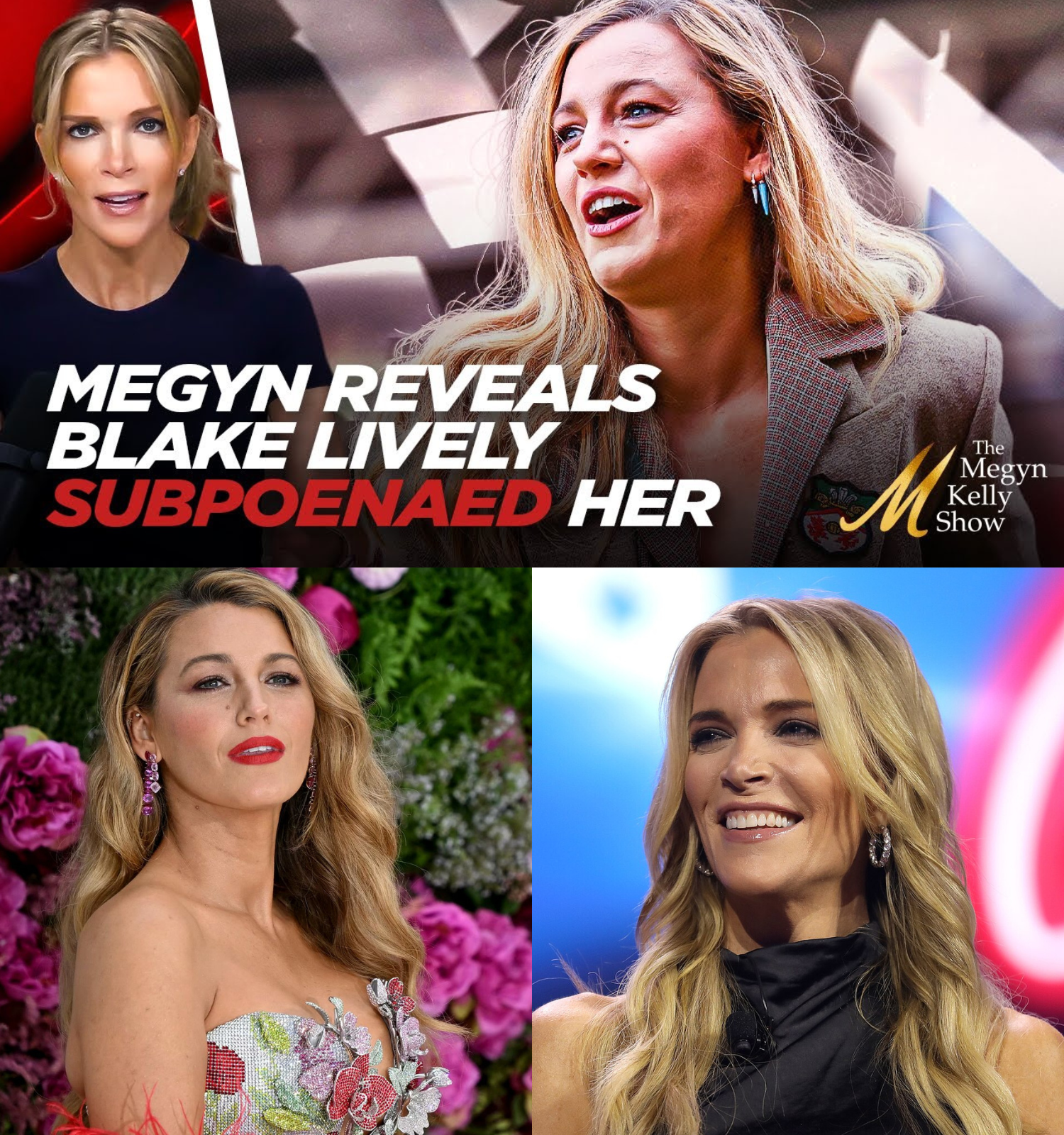Megyn Kelly Claims Blake Lively Subpoenaed Her, Implying She Was Paid by Justin Baldoni
In a fiery broadcast on August 28, 2025, media personality Megyn Kelly accused actress Blake Lively of targeting her in the escalating legal battle between Lively and actor-director Justin Baldoni. Speaking on her SiriusXM show, Kelly labeled Lively a “narcissistic bully,” asserting that Lively had subpoenaed her team—and insinuated that Kelly was being paid by Baldoni to spread damaging narratives about Lively. Kelly celebrated what she described as a legal victory: her team successfully resisted the subpoena, refusing to hand over any communications.
EW.com+3TheWrap+3New York Post+3Courthouse News+4Page Six+4New York Post+4
1. The Allegations: Subpoena and Motivation
Megyn Kelly claimed that a subpoena, reportedly issued by Lively’s legal camp, targeted private communications involving Kelly and her show team. Kelly asserted: “We gave her absolutely nothing. Not one document, not one record, not one communication.” She framed this pushback as a First Amendment victory—standing firm against what she described as undue legal and media pressure.
New York Post
Adding a provocative twist, Kelly underscored the insinuation she perceived in Lively’s legal strategy: “If you’re not speaking out against her, you must be on her payroll.” Kelly suggested Lively was portraying dissent as financially incentivized rather than legitimate criticism.
Lawyer Monthly+10Yahoo+10New York Post+10
2. Lively’s Response: Disputed Claims and Legal Normality
A spokesperson for Blake Lively quickly pushed back, stating that Lively never subpoenaed Kelly directly. Instead, she was pursuing standard discovery procedures—gathering evidence relevant to her harassment claims, which include text messages, emails, and invoices. The spokesperson noted the inclusion of invoices related to services from PR consultant Jed Wallace, as well as communications with media companies.
Wikipedia+4Page Six+4New York Post+4
3. Judicial Pushback: Subpoenas Blocked by Judge
In an important legal development, a federal judge recently blocked most of Lively’s subpoenas, citing issues of privilege and lack of relevance. This judicial ruling appears to align with Kelly’s account of resisting the subpoena, though it doesn’t explicitly confirm the identities involved in each blocked request.
Yahoo News UK+15Lawyer Monthly+15New York Post+15
4. The Broader Legal Drama: Context for the Accusations
To fully appreciate the gravity of the subpoena dispute, it bears stepping back to understand the wider courtroom backdrop:
-
December 2024: Lively filed a sexual harassment and retaliation complaint with the California Civil Rights Department, alleging inappropriate behavior and a hostile work environment on the set of It Ends With Us.
Page Six+15Wikipedia+15Page Six+15 -
January 2025: Baldoni countersued—filing a $400 million defamation and extortion lawsuit against Lively, her husband Ryan Reynolds, and their publicist.
Yahoo+15Wikipedia+15Page Six+15 -
June 2025: A federal judge dismissed Baldoni’s lawsuit, deeming Lively’s original harassment allegations as legally protected speech.
Wikipedia+1 -
Ongoing: Scheduled trial currently slated for March 2026, focusing on Lively’s remaining claims and discovery disputes.
thetimes.co.uk+15Wikipedia+15Yahoo+15 -
Unsealed Documents: The judge also unsealed communications suggesting that Baldoni’s team orchestrated a sophisticated PR-driven smear campaign, possibly costing tens of thousands of dollars per month.
Wikipedia+10Page Six+10Page Six+10
5. Summary & Implications
Kelly’s remarks raise two interlocking claims:
-
Legal Overreach: She alleges that Lively’s subpoena sought to pry into Kelly’s private communications—a move Kelly perceives as legally and ethically overzealous.
-
Character Attack: By framing Kelly’s dissenting coverage as paid, Kelly maintains that Lively is painting criticism not as opinion but as financially motivated disloyalty.
From Lively’s perspective, the subpoenas formed part of a routine discovery strategy—intended to uncover relevant evidence. The judge’s decision to block most subpoenas highlights the legal system’s balancing act between evidence gathering and respecting legal boundaries like privilege.
Key Questions Ahead
Here are some of the questions driving this developing dispute:
-
Legal Scope: Were Kelly’s communications truly relevant to Lively’s claims? If not, the judge’s blocking of subpoenas may reflect that.
-
Intent vs. Strategy: Was there an intent to intimidate media critics—or was this a standard legal maneuver caught in legal scrutiny?
-
Public Perception: Kelly’s remarks underscore the reputational landscape—where dissent is increasingly viewed through the lens of loyalty or coercion, rather than principle.
Conclusion
Megyn Kelly’s on-air denouncement of Blake Lively blends legal resistance with cultural confrontation. It underscores how media figures, lawsuits, and Hollywood personalities converge in a broader conversation about power, speech, and who gets to shape the narrative.
While Kelly paints her legal victory as a defense of openness, Lively’s team views it as a necessary step in pursuing accountability. As both sides gear up for the 2026 trial, this clash illustrates the increasingly blurred lines between legal battles and public theater.


